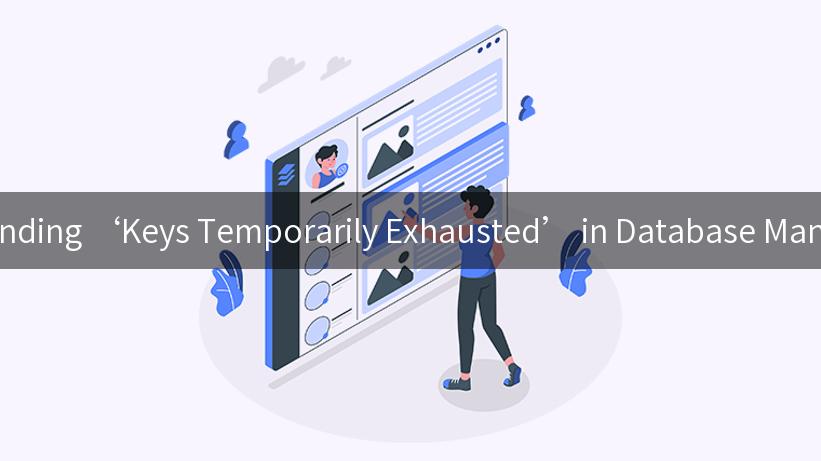
In the ever-evolving world of technology, a common challenge in database management arises when dealing with API calls. One such challenge that API developers often encounter is the situation of “keys temporarily exhausted.” This article will delve into the concept of key exhaustion, particularly focusing on aspects related to API calls, Tyk API Developer Portal, IP Blacklist/Whitelist, and how these elements interact within the database management ecosystem.
What Does ‘Keys Temporarily Exhausted’ Mean?
In a typical API environment, keys are utilized for authentication and authorization purposes. Each key corresponds to a user or a service that can make requests to the API. When the number of requests made using a particular API key exceeds the quotas set by the service provider, it leads to the status of “keys temporarily exhausted.” This can happen for several reasons, including high traffic volumes, inefficient API usage, or improper key management. Understanding the fundamental reasons behind key exhaustion is paramount for developers to engineer efficient and resilient systems.
The Role of API Calls in Database Management
API calls play a significant role in how applications interact with databases. Whether retrieving data, inserting new records, or updating existing ones, APIs serve as the intermediary that ensures secure and efficient communication. When developers make API calls, they often utilize keys for tracking usage and enforcing limits.
These keys help manage access and maintain security protocols, all while allowing response metrics to be captured for later analysis. However, when too many API calls are made in a short time frame, it can lead to key exhaustion. This not only impedes user experience but can also disrupt the functioning of applications that rely on these API interactions.
Understanding Tyk API Developer Portal
The Tyk API Developer Portal is a robust gateway for managing APIs efficiently. It provides features such as key management, analytics, and documentation which ensures that developers have everything they need to utilize the provided API successfully. Tyk facilitates the setup of limits and quotas for API usage, which are instrumental in preventing key exhaustion.
Advantages of Using Tyk:
| Feature |
Description |
| API Key Management |
Allows for easy generation, management, and distribution of API keys. |
| Rate Limiting |
Sets limits on how many API calls can be made within a specific timeframe. |
| Analytics and Monitoring |
Provides real-time metrics and logging to observe API usage patterns. |
| Documentation Support |
Helps developers understand how to implement APIs effectively. |
By leveraging the Tyk API Developer Portal, developers can better control their API usage, reducing the chances of running into key exhaustion.
IP Blacklist/Whitelist in API Management
Another essential consideration in API management is the implementation of IP Blacklist/Whitelist. This strategy is often employed to enhance security and manage access more effectively. Blacklisting refers to blocking specific IP addresses from making API calls, while whitelisting involves granting access only to specific, trusted IP addresses.
Why Use Blacklists and Whitelists?
-
Security: Prevents malicious attacks from unauthorized users, which can consume API keys excessively.
-
Resource Management: Reduces unwanted traffic and helps maintain system stability.
-
Usage Control: By limiting users based on their IP addresses, developers can better manage the number of calls made using specific API keys, thereby preventing exhaustion.
How to Handle ‘Keys Temporarily Exhausted’
When encountering a situation where keys are temporarily exhausted, developers can take several actions to mitigate the issue:
-
Monitor Traffic Patterns: Regularly check the metrics within the Tyk API Developer Portal to identify spikes in usage or irregularities.
-
Implement Throttling: Define a rate-limiting strategy that prevents users from exceeding allowed API calls within a given timeframe.
-
Optimize API Calls: Encourage best practices among users regarding how API calls are performed. Implement batching of requests instead of multiple single calls.
-
Adjust Quotas: If legitimate users frequently exhaust their keys due to high usage, consider adjusting the quotas to suit their needs better.
-
Utilize IP Whitelist/Blacklist: To manage access and refine control over who can make API calls, implement IP whitelisting for trusted users while banning suspicious addresses.
Code Example: API Rate Limiting Implementation
Here’s a sample code snippet using Node.js and Express that demonstrates how to limit the number of API calls from a user to prevent key exhaustion.
const express = require('express');
const rateLimit = require('express-rate-limit');
const app = express();
const limiter = rateLimit({
windowMs: 1 * 60 * 1000, // 1 minute
max: 5, // limit each IP to 5 requests per windowMs
message: 'Too many requests from this IP, please try again later.'
});
// Apply the rate limiting middleware to all API calls
app.use('/api/', limiter);
app.get('/api/data', (req, res) => {
res.status(200).json({ message: 'Data fetched successfully!' });
});
app.listen(3000, () => {
console.log('Server running on port 3000');
});
Conclusion
Understanding and managing the concept of “keys temporarily exhausted” is crucial for any API developer. It is essential to incorporate proper strategies to prevent this from becoming a significant issue, as it can lead to poor user experiences and disruptions to service.
By leveraging tools like the Tyk API Developer Portal, monitoring usage patterns, implementing IP Blacklist/Whitelist strategies, and optimizing API calls, developers can effectively manage their keys and ensure smooth operations within their applications.
Moreover, the right understanding of API call limits and proactive strategies will enable developers to devise resilient architectures that not only serve current demands but also scale efficiently with future needs.
APIPark is a high-performance AI gateway that allows you to securely access the most comprehensive LLM APIs globally on the APIPark platform, including OpenAI, Anthropic, Mistral, Llama2, Google Gemini, and more.Try APIPark now! 👇👇👇
By incorporating these practices, you can overcome the challenges associated with API key exhaustion and contribute positively to a robust database management system that supports your application’s needs.